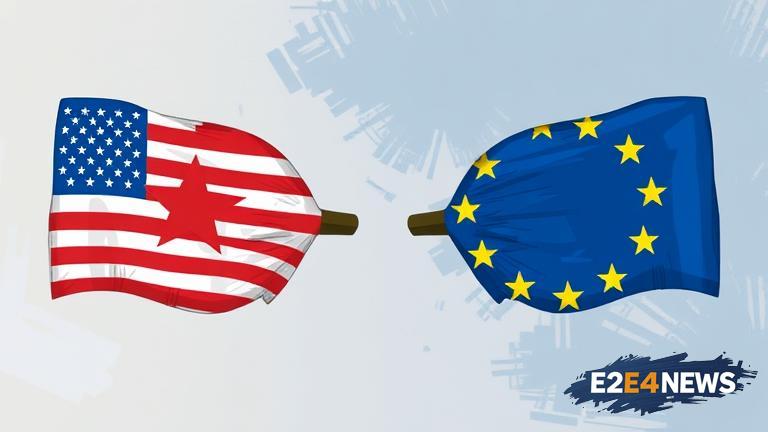The United States has threatened to impose sanctions on European Union officials in response to the EU’s proposed tech law, which aims to regulate big tech companies. This move has raised significant risks for global enterprises, as it may lead to a trade war and disrupt international cooperation. The EU’s tech law, known as the Digital Services Act, seeks to hold tech companies accountable for the content they host and to promote transparency and fairness in their business practices. The US has expressed concerns that the law unfairly targets American tech companies and may violate international trade agreements. The threat of sanctions has sparked concerns among global enterprises, which may be caught in the middle of the dispute. Many companies have operations in both the US and EU, and may be forced to navigate complex and conflicting regulatory requirements. The dispute may also lead to a decline in international trade and cooperation, as companies may be hesitant to invest in countries with uncertain regulatory environments. Furthermore, the sanctions threat may embolden other countries to impose their own regulations on tech companies, leading to a fragmented and confusing global regulatory landscape. The EU has defended its tech law, arguing that it is necessary to protect consumers and promote fair competition. The US, on the other hand, has argued that the law is protectionist and may stifle innovation. The dispute highlights the challenges of regulating global tech companies, which often operate across multiple jurisdictions and are subject to different regulatory requirements. As the situation continues to unfold, global enterprises are advised to closely monitor developments and to prepare for potential changes in the regulatory landscape. The US-EU tech law dispute has significant implications for the global economy, as it may impact trade, investment, and innovation. The dispute also raises questions about the role of governments in regulating tech companies and the need for international cooperation in addressing the challenges posed by the digital economy. In recent years, there has been a growing trend towards greater regulation of tech companies, with many countries imposing new rules and requirements on these companies. The EU’s tech law is part of this trend, and reflects a growing recognition of the need to hold tech companies accountable for their actions. However, the US threat of sanctions has raised concerns that the dispute may escalate into a full-blown trade war, with significant consequences for global enterprises. The situation is complex and multifaceted, and will require careful navigation by companies and governments alike. As the dispute continues to unfold, it is likely that there will be significant developments and updates, and global enterprises are advised to stay informed and to be prepared for potential changes in the regulatory landscape. The US-EU tech law dispute is a significant issue, with far-reaching implications for the global economy and the tech industry. It highlights the need for international cooperation and the importance of finding common ground in regulating global tech companies. The dispute also raises questions about the role of governments in regulating the digital economy and the need for a balanced approach that promotes innovation and protects consumers. In conclusion, the US-EU tech law dispute is a complex and multifaceted issue, with significant implications for global enterprises and the global economy. As the situation continues to unfold, it is essential to stay informed and to be prepared for potential changes in the regulatory landscape.
